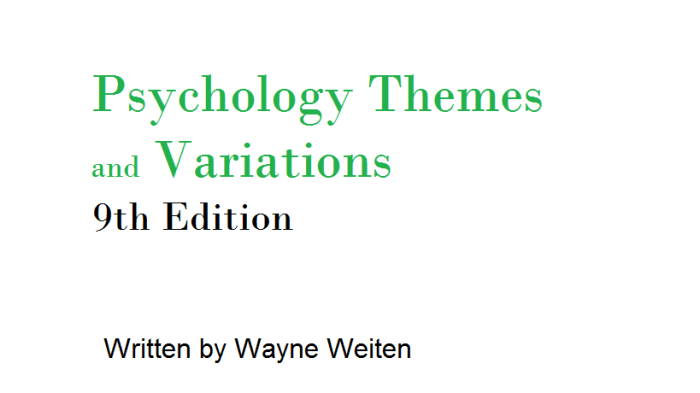Psychology Themes and Variations 10th Edition embarks on a comprehensive journey into the intricate world of human psychology. This authoritative text delves into the fundamental principles, major themes, and diverse perspectives that shape our understanding of the human mind and behavior.
From the biological underpinnings of behavior to the complexities of social interactions, this edition provides a comprehensive exploration of the field, offering a profound understanding of the human experience.
1. Introduction
Psychology is the scientific study of behavior and mental processes. It is a broad field that encompasses many different areas of research, from the study of how the brain works to the study of how people interact with each other.
The 10th edition of “Psychology: Themes and Variations” provides a comprehensive overview of the field of psychology, covering the major themes, research methods, and applications of the discipline.
2. Major Themes in Psychology
The main themes explored in the textbook include:
- The nature of psychology and its methods
- Biological bases of behavior
- Sensation and perception
- Learning
- Memory
- Cognition
- Motivation and emotion
- Development
- Personality
- Social psychology
- Abnormal psychology
- Health psychology
- Applied psychology
3. Research Methods in Psychology
Psychologists use a variety of research methods to study behavior and mental processes, including:
- Observational methods
- Experimental methods
- Correlational methods
- Case studies
- Surveys
Each method has its own strengths and limitations, and psychologists must carefully consider the best method to use for each research question.
4. Biological Bases of Behavior: Psychology Themes And Variations 10th Ed

The brain and nervous system play a critical role in behavior. Psychologists study the biological bases of behavior to understand how the brain and body interact to produce thoughts, feelings, and actions.
Neuroanatomy
The study of the structure of the brain and nervous system.
Neurophysiology
The study of the function of the brain and nervous system.
Neurochemistry
The study of the chemical processes that occur in the brain and nervous system.
Neuroimaging
The use of imaging techniques to study the structure and function of the brain.
5. Sensation and Perception

Sensation is the process of detecting physical stimuli from the environment, while perception is the process of interpreting those stimuli and giving them meaning. Psychologists study sensation and perception to understand how we experience the world around us.
Sensation
The detection of physical stimuli from the environment.
Perception
The interpretation of sensory stimuli and giving them meaning.
Psychophysics
The study of the relationship between physical stimuli and psychological responses.
Sensory systems
The different systems in the body that are responsible for detecting and processing sensory information.
6. Learning
Learning is the process of acquiring new knowledge, skills, or behaviors. Psychologists study learning to understand how we learn new things and how we change our behavior over time.
Classical conditioning
A type of learning in which a neutral stimulus is paired with a reflex-eliciting stimulus, so that the neutral stimulus eventually elicits the reflex.
Operant conditioning, Psychology themes and variations 10th ed
A type of learning in which a behavior is reinforced or punished, so that the behavior is more or less likely to occur in the future.
Social learning
A type of learning in which people learn new behaviors by observing others.
Cognitive learning
A type of learning in which people learn new knowledge and skills by thinking and problem-solving.
Query Resolution
What is the primary focus of Psychology Themes and Variations 10th Edition?
Psychology Themes and Variations 10th Edition focuses on providing a comprehensive overview of the major themes, research methods, and practical applications within the field of psychology.
What are some of the key themes explored in the textbook?
The textbook explores themes such as the biological bases of behavior, sensation and perception, learning, memory, cognition, motivation and emotion, development, personality, social psychology, abnormal psychology, health psychology, and applied psychology.
How does the textbook approach research methods in psychology?
The textbook provides a detailed examination of different research methods used in psychology, including their strengths and limitations, to equip readers with a critical understanding of research design and methodology.

